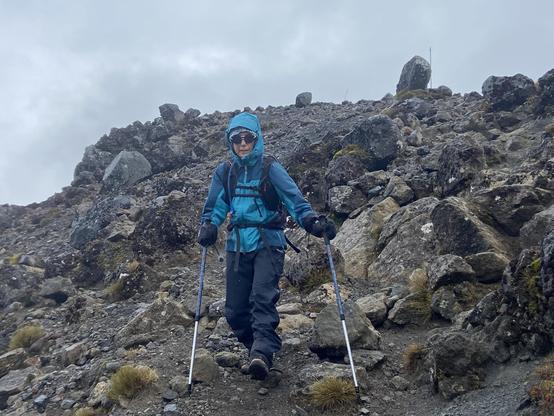2025-12-18 16:22:06
My favorite video game company is currently making news because they admitted to falling to AI hype and pushing it on employees even though they’ve (predictably) seen no actual benefits.
I am sad about it but, in good news, writing with a fountain pen continues to be an extreme delight.
I developed carpal tunnel nine years ago, and handwriting would always be a stolen joy in the brief moments before pain would start again. I have been feeling nearly 0 pain in the last two weeks despite filling 50 pages. I feel like I’ve been given a new lease on life in a small way.
2025-12-18 18:44:53
I haven’t tuned into CBS since its morning news promoted that interview (and Weiss) last week. This latest announcement validates my decision.
“CBS News launches town hall series featuring JD Vance following Bari Weiss’ ratings flop”
https://www.indep…
2026-02-17 20:49:10
This is in stark contrast to my brief experiences with Ansible, which gave me the feeling of “oh, this is a lot to learn, but I see where they’re going and it makes sense.”
My last Ansible investigation stalled out trying to set up a clean process for issuing Let’s Encrypt certs, and I maybe need to pick those investigations back up again.
2025-12-17 03:35:43
My plans to hike the Tongariro Alpine Crossing were derailed by two days of rain and high winds, so we made a plan B: the Tama lakes track, which has somewhat less exposure but still gets up over 1400m. We’re lucky we didn’t try Tongariro given how tough the conditions were at Tama lakes – driving snow and winds on the ridge. But we were rewarded with good views and improving weather on the return trip. #hiking
2026-01-05 11:44:42
If you are an anti-fascist, you are against petroleum. Petroleum funds fascism globally. It is at the heart of the military industrial complex driving global imperialism, from both the US and Russia. Motonormitivity is fascist, both in it's elitist roots and in it's ties to historical fascism (Hitler hated bikes, just on principle). Oil is militarism.
Oil is the dominant resource which drives war, both in terms of it being the primary spoil wars are fought over and in terms of fueling the military vehicles and weapons that carry out those wars. Practically every war since (and including) WWII has been over oil. Genocides are carried out to secure oil. Gaza is over oil, in more ways than one.
Oil is the absolute enemy, and AI is simply an extension of that: an attempt to atomize us so we can't resist the oil-centric global order, one last grasp at the control over our lives oil has given to those whose power is now threatened by a solar punk future.
"I haven't written for a few weeks now. As I write the closing chapter and begin rewriting previous sections, everything feels both more distant and more immediate. The working title [Kairos] has only continued to feel more and more resonant, both during the writing and during my pause."
Now is the time to resist by making something different, by creating a world fundamentally opposed to these systems of oppression.
This is the last in my Kairos series. From here on out I'll be editing to try and make it more of a book than a series of posts. Thanks to everyone who has helped so far. All editing is welcome (typos, spell checks, questions and challenges). Between ADHD and dyslexia, it's always hard for my brain to notice mistakes in my own text so I always appreciate the support of those who can.
https://anarchoccultism.org/building-zion/kairos
2026-01-15 02:32:28
Just finished "Far Sector" written by N. K. Jemisin and illustrated by Jamal Campbell. I don't normally go for Marvel/DC comics stuff and this was a good reminder why. Jemisin's authorship was the draw for me here, as well as some curiosity about what I might be missing out on by avoiding the classic comics lineage. I won't go into too much detail about particulars, but suffice to say it ends up feeling to me line a very neoliberal story dressed up in a veneer of radicalism, which is not what I'd expected of Jemisin. Particularly in light of current events, the "good cops" aspects of the storyline ring truly hollow. There's still a lot of neat parts, but I guess I also wound up disappointed by the sci-fi aspects in a lot off ways. I truly think Jemisin is capable of better than this, based on her other (excellent) work.
#AmReading #ReadingNow
2026-01-06 21:37:38
“This is not 'spicy'. This is illegal. This is appalling. This is disgusting.“
"The European Commission has announced it is looking into cases of sexually suggestive and explicit images of young girls generated by Grok, the AI chatbot integrated into social media platform X, following the introduction of a paid feature known as “Spicy Mode” last summer."
2025-12-09 15:44:49
FBI Is Offering a “Bounty” for Reporting “Anti-Trump Thought”
https://www.democracynow.org/2025/12/8/ken_klippenstein_fbi_domestic_terrorism_nspm7
2025-12-02 18:55:52
Bending Spoons acquires Eventbrite for ~$500M in an all-cash deal, following its $1.38B purchase of Vimeo and a pending acquisition of AOL (Cate Lawrence/Tech.eu)
https://tech.eu/2025/12/02/bending-spoons-to-acquire-eventbrite-in-500m-all-cash-deal/
2025-11-20 00:09:44
My mother is incredible.
We like to joke that she is a model #immigrant:
- She came to the #US fleeing from the war in #Ukraine, with no further plan besides getting to me and my husband in at least temporary safety.
- We had to run a crowdfunding campaign to help her and the kids sustain themselves as they waited for their #TPS immigration paperwork to process.
- Once her work authorization came through, she somehow managed to get a job as faculty at #Cornell - and started their #Ukrainian program, teaching the language and Ukrainian history for the first time in the university’s curriculum.
- Now she’s been accepted to academic conferences, publications, and has joined the board of the refugee support organization in #Ithaca that helped her get settled there herself.
I’m so proud of her. Y’all should read this article, it’s pretty good: https://www.ithacawelcomesrefugees.org/giving-from-abundance-krystynas-journey-to-becoming-an-iwr-board-member/






